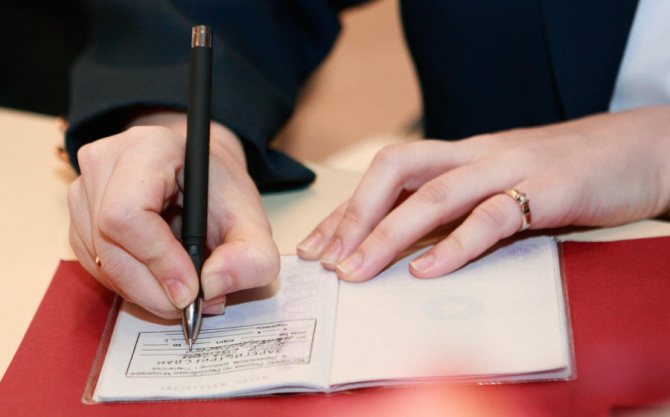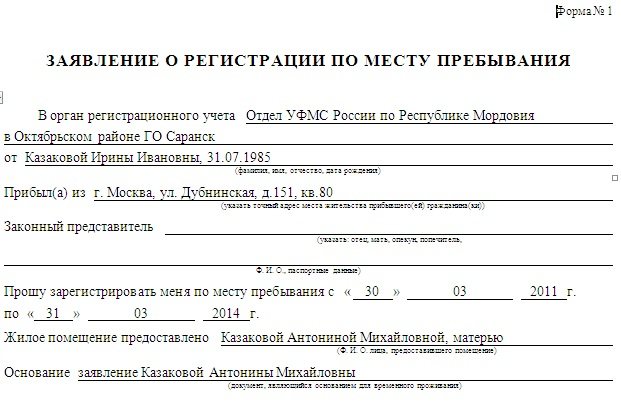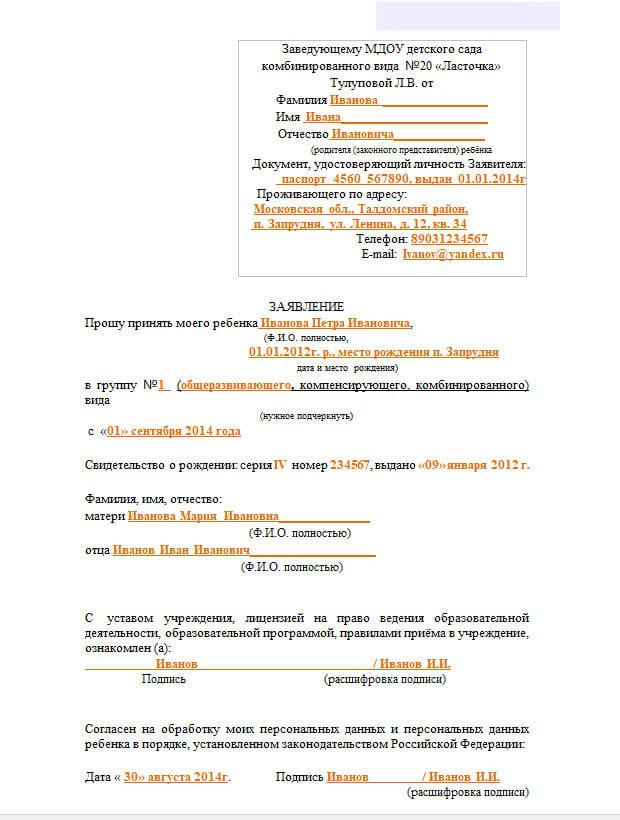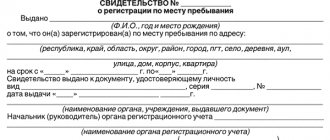Requests for temporary registration can be heard quite often. Indeed, a chance has turned up to get a more promising job, or to transfer a child to a good school...
But the apartment owners are in no hurry to accommodate and very often refuse. It’s understandable – it’s easy to register a child, but how do you discharge them later? In fact, there is no need to be afraid, you just need to be attentive.
In the article we will talk about the dangers of temporary registration of a child for the owner.
Dear readers! Our articles talk about typical ways to resolve legal issues, but each case is unique.
If you want to find out how to solve your particular problem, please contact the online consultant form on the right! It's fast and free!
There is no need to be afraid - the little citizen will not have any proprietary rights to his home.
.
He will be able to live on the territory together with his guardian (he will not be registered separately), use common property, go to school, receive additional benefits - in short, everything that registration provides.
But as soon as the registration period expires, the citizen’s right to reside in an apartment expires, and at the same time so does his child’s (Article 20 of the Civil Code).
Article 20. Place of residence of a citizen
- Place of residence is the place where a citizen permanently or primarily resides. A citizen who informs creditors, as well as other persons, about his other place of residence bears the risk of the consequences caused by this.
- The place of residence of minors under fourteen years of age or citizens under guardianship is recognized as the place of residence of their legal representatives - parents, adoptive parents or guardians.
Registration does not give any proprietary rights. That is, a citizen will not be able to sell square meters, pledge them, exchange them, or donate them.
However, to do this you need to make sure that you are really registering the person temporarily. To do this, in the application that will be given at the passport department of the police department or housing department, you need to indicate a dated framework - for how long you are registering guests with you. The maximum limit is five years.
If you do not indicate this in the application, it turns out that you have registered both the guest and his child on a permanent basis. And removing them from registration without their desire will be very difficult, although feasible.
Firstly, only through the court.
Secondly, since the human right to housing, as well as the rights of children, is affected, it is impossible to do without the involvement of a qualified defense lawyer - this is also an expense.
And even in this case, there is no guarantee that the matter will end in success.
So this can be considered as another reason for increased care when filling out legally important papers.
If we are talking specifically about a temporarily registered citizen, then no difficulties will arise.
Upon expiration of the period specified in the application, the right to reside at this address for the person, and therefore for all members of his family, is terminated automatically.
The child will go to the address where his father or mother will go.
Before the expiration of the period, if there are no compelling reasons, it will be possible to evict a citizen, and even with a child, only through the court.
Moreover, it will be necessary to confirm that the little person is not thrown out onto the street, that he has food, and a place to live.
If this is not done or the judge finds the arguments unconvincing, he will leave the guests to live out quietly until the end of the registration period.
Why is temporary registration of a minor dangerous for the owner?
As already mentioned, it will not be possible to discharge a guest before the end of his registration period, and in the case of a minor, even the court will most likely refuse.
The rent will increase, which was also mentioned, and it often happens that the resident does not want to pay for housing. An even less pleasant situation can happen - if a guest suddenly decides to take out a loan, he will most likely indicate as the address the one at which he is registered.
There is a high probability that difficulties will arise with payment. No, of course, harsh bailiffs will not demand repayment of the debt from the apartment owner. But they can pay a visit. Not to mention the “letters of happiness” that will also be sent to this address.
So it turns out that registering a minor does not seem to threaten anything global. But it can ruin your nerves. That is why you need to carefully consider who you are going to help in solving a life problem and whether the person will create difficulties for you.
The temporary registration provided for by the legislation of the Russian Federation for a child with Russian citizenship has some features compared to registration at the place of residence of adult Russians. There are no particular difficulties in the procedure. Registration of temporary registration of minors has been simplified due to one of the key points - obtaining the consent of the home owner.
Grounds for forced eviction of a tenant
The rights of citizens registered temporarily are similar to those they receive at their place of permanent registration:
- the right to be present and live in this area;
- register your underage children at this address without the consent of the owner and other interested parties.
However, these citizens do not have an independent right of use, since the owner of the apartment bears responsibility for their actions, and therefore temporary residents have responsibilities:
- use the provided premises strictly for its intended purpose;
- maintain its appearance and integrity;
- respect the rights and interests of neighbors;
- adhere to fire safety, sanitary and environmental requirements;
- voluntarily move out of the apartment after the expiration of the period of residence.
In cases where the registration period has not yet expired, but it is necessary to evict the tenant, it is enough to submit an application to the FMS, where it is necessary to indicate the details of the applicant, documents confirming his rights to the apartment, details of the person to be discharged and the reason why the citizen needs to be discharged.
Reasons for deregistration may include the following circumstances:
- a court decision on deprivation of liberty, immediately after the citizen’s sentence comes into force, can be removed from the registration register;
- after a court decision declaring a person dead or missing has entered into force;
- eviction from housing by court decision;
- registration at another place of residence;
- providing false or forged documents;
- violation by residents of the rules of residence.
We suggest you read: The court will give the child to the father if the apartment is not registered in my name
Features of temporary registration of children
If minor children have Russian citizenship, they are subject to Art. 5 N 5242-1-FZ, which defines the rights of Russians to free movement, the possibility of the same free choice of place of residence, temporary or permanent. The temporary registration form is most relevant for children following their parents on long business trips and frequent moves. In a new place, parents are required to register them with the territorial office of the Federal Migration Service if they are planning to live in a certain residential area for more than 90 days.
An application must be submitted to the Federal Migration Service or to persons whose functional responsibilities include registration. If there are none at the place of stay, they turn to the owner of the property for assistance. Temporary registration for the child is issued by his parents, guardians and other legal representatives. Fourteen-year-old teenagers do this on their own, having previously agreed on their decision with them.
Norm Art. 20 of the previously mentioned law emphasizes that the registration of a minor child is carried out exclusively at the place of residence of his legal representatives, in the apartment, the house where they themselves are registered or will be registered. Parents or guardians of children who are not homeowners are registered with the consent of the landlord of the rented home or its owner.
And for the temporary registration of a child in an apartment rented by a family, no approval from its owner is required. The federal law justified its position simply: the place of residence of a minor is where his parents live. This norm applies to all types of housing: privatized, municipal, and cooperative. If they lose their parents, children can receive temporary shelter and registration in orphanages or foster families. In this case, a simplified regular registration scheme is used.
The temporary registration period expires automatically. And since it begins on the day the parents apply to the Federal Migration Service, there may be a discrepancy in the timing of registration of the child and his father and mother. In this case, the way out is to renew the parents’ registration.
Review of the main points
Registration of non-residents of Russia at the place of residence was introduced in 2007. In July 2006, Federal Law No. 109 was issued, approving the need to register citizens coming from other countries.
In January 2007, Resolution No. 9 was issued, outlining the procedure for registering foreigners and stateless persons. A foreign citizen can be registered in a residential premises if he actually plans to live in it.
If the receiving party invites a foreigner, it has the right to register him, as stated in FMS Order No. 364 (08/29/2013). Otherwise, the foreigner himself looks for a place to live and negotiates with the owner about registration. “Fictitious registration” of foreigners is punishable according to the Criminal Code, Art. 322.3 or leads to administrative liability.
Article 322.2. Fictitious registration of a citizen of the Russian Federation at the place of stay or at the place of residence in a residential building
“Fictitious” should be understood as registration of a foreigner when:
- false information and false documents were submitted to the registration authority in 2021;
- the citizen registered, but did not initially plan to live at this address;
- the receiving party registered the citizen, but did not plan to provide him with living space.
Documentation for registration
The legal norm, which made it possible to obtain temporary registration for a child without the necessary approval of the owner of the property, simplified the process of its registration. However, in order to legitimize the temporary stay of children in the living space where their parents are registered, a documentary justification for the application for registration is submitted to the local FMS office.
What documents will be required for this registration procedure? The current registration rules adopted by the government of the country define a very small list of them:
- birth certificate (for children under 14 years of age);
- internal passport of a Russian citizen (a birth certificate is not considered by law as a document certifying citizenship for adolescents 14-18 years old);
But sometimes everyday conflicts arise when registration will nevertheless be carried out on the basis of certain types of documentation, enshrined in the Regulations on the procedure for considering Russian citizenship:
- birth certificates;
- foreign passport of a citizen of the Russian Federation issued to the child;
- a note on Russian citizenship in the birth certificate or an annex (insert) to the certificate (cancelled in 2007);
- passports of a citizen of the Russian Federation (domestic or foreign) of the father or mother with information about the children entered into it, etc.
If there is no mark on the child’s civil status certificate, it is enough for the father or mother to contact the registry office with a minimum package of required papers so that the appropriate stamp is affixed to it.
It is especially worth noting: the international passport itself, identifying the child, is not recognized by law as the main document when registering for registration in the apartment in which his parents live. A fourteen-year-old must include a birth certificate. According to current regulations, it is not possible to use a temporary identity card of a citizen of the Russian Federation (form 2P) for registration.
After three days, parents receive from the migration service, which is considering the application, a certificate of temporary registration of the child with data on registration at the place of residence of the family. The issuance of documentation completing registration risks taking up to 8 days if false information or information that requires additional study is provided.
Self-registration by a teenager
It is impossible to temporarily register children under 14 years of age, separating them from their legal representatives. In response to the constantly asked question of whether it is possible to temporarily register a child with grandparents, legislative norms allow this possibility, provided that at least one of the parents is registered in the relatives’ living space.
For a teenager, solving the question of how to obtain a temporary registration on their own will not cause any particular difficulties. This right is granted to him by law. But the registration procedure itself is somewhat more complicated, since to complete it you need:
- Written permission (consent) of one of the parents, guardian or adoptive parent.
- Justification for moving into the desired apartment and subsequent residence in it temporarily. For independent registration of a teenager, the following are additionally provided:
- certificate of state registration of ownership of housing;
- a petition from a person who wishes to provide the teenager with his/her living quarters;
- social rental agreement;
- rental (sublease) agreement for housing.
There are no marks in the passport or certificate of temporary registration. Without temporary registration, the family will inevitably face difficulties in registering preschool children in kindergartens, and schoolchildren and students in general education institutions and universities. Difficulties may also arise when contacting medical institutions, as well as various official structures.
Is it possible to register without parents?
In accordance with current legislation, this opportunity is provided for a child who has reached the age of 14.

To carry out the registration procedure you must:
- consent of the parent or legal representative for temporary registration;
- provide a document that is the basis for registration (confirmation of registration of parents);
- a statement drawn up in the prescribed form.
Accordingly, for children under 14 years of age, this option does not seem realistic.
The obligation to register children who are left without parents falls on the administration of specialized institutions or on trustees (foster families).
Temporary registration of a newborn
Legislative provisions do not differentiate between minors in temporary registration until they reach the age of 14. It is also necessary to register a newborn, like other children. Unlike others, the newborn not only does not have a passport, but even a birth certificate. Parents must obtain this first official document in the baby’s life from the Civil Registry Office by providing a birth certificate from a maternity hospital, clinic department, private doctor or witness to an unplanned birth.
What documents, in addition to a birth certificate with a mandatory mark on citizenship, must be additionally submitted to the FMS office? The application for registration of a newborn child (form 6) is accompanied by:
- certificates of temporary registration of parents;
- a certificate from the place of residence of the second parent with information about the absence of registration of the baby at this address.
The second document is attached if the parents are temporarily registered at different addresses, but are married or not officially registered, or are getting divorced. A newborn is registered in the area temporarily occupied by his parents, without the consent of the homeowner.
The legislation does not rush parents to register their baby temporarily, but the assignment of benefits, receipt of maternity capital, queue for kindergarten, etc. depend on registration. In addition, delaying the registration process beyond the period established by law threatens parents with penalties, as well as the owner of the property who allowed residence without temporary registration.
There are no negative consequences and risks for the homeowner when temporarily registering tenants with children, since it is canceled after the expiration of the period specified in the documentation.
Citizen registration is an official procedure that determines the location of a specific person. There are two different forms of registration: permanent and temporary.
Registration made at the place of stay is considered temporary. This form is very relevant for children who move from one region to another together with their parents.
Registration documents are required in educational and medical institutions, as well as other official authorities. It is necessary to carry out registration in situations where the child is in an apartment or in a private house for a certain period of time, but not less than three months. Let’s take a closer look at how to register a child at the place of residence and what documents are needed.
Rules for registering persons
The temporary registration procedure is regulated by Decree of the Government of the Russian Federation dated July 17, 1995 No. 713 and Order of the Ministry of Internal Affairs of Russia dated December 31, 2021 No. 984. The basis for registration is the application of the interested person. It is drawn up according to forms 1 and 1P specified in Order of the Ministry of Internal Affairs No. 984. Such samples are also used in relation to children.
As part of registration at the place of residence, the law divides children into two categories:
- Under fourteen years of age.
- Between the ages of fourteen and eighteen.

These factors introduce some features into the registration procedure itself. This applies to obtaining the consent of legal representatives and owners of residential premises. In any case, the presence of these persons is required during registration.
Up to 14 years old
Children at this age have a special status. With rare exceptions, they are deprived of the right to take any actions in their own interests. This can be done by their legal representatives. Such a child can only be registered together with his parents, guardians or adoptive parents, or with one of them.
The baby is registered at the residence address of his legal representatives, provided that the latter are themselves registered there. In this case, the consent of the owner of the property is not required (what is the danger for the owner of temporary registration of a child?). The area of the room is not taken into account.
Reference! If the parents live separately, then it will be necessary to determine the place of registration of the baby by reaching an agreement or in court.
Read about why temporary registration of a newborn child without permanent registration is needed and how to do it here.
After 14 years
When a child turns fourteen years old, his status changes somewhat. He gets more rights. Accordingly, the rules for temporary registration are changing somewhat.
- As before, a child can be registered together with his legal representatives. In this case, the consent of the homeowner is not required. If the child will temporarily live with one of the parents, it is necessary to obtain a positive response from the other.
- The situation will be somewhat different if the child lives separately from his legal representatives. Then you will need not only the consent of the latter, but also the owner of the property where the minor will be registered.
We suggest you read: How to draw up a will for an apartment, how much it costs and what documents are needed Law and home
Temporary registration for a newborn baby
Temporary registration of a newborn child is carried out after the registration authorities receive the following documents:
- documentation confirming the temporary registration of parents;
- birth certificate with mandatory citizenship stamp; statement;
- information certificate from the place of residence of the second parent about the lack of registration.
Legal acts do not establish specific deadlines for completing documentation for newborn children.
Options for temporary registration of a minor child
Registration of minor children may occur in the following scenarios:
- as an addition to temporary parental registration
. In this case, the implementation of actions does not require the acceptance of property owners, representatives of housing cooperatives or HOAs. Temporary registration does not change the existing property mechanism, but only records the fact that the child is at a specific address.
- The child's parents are registered at different addresses
. In this case, the family lives in one apartment. In this situation, there is a need to register the child temporarily. The choice of address is made by parents jointly.
- There are no official family relations between the child's parents
. Temporary registration of a mother and child may cause conflicts with the father. The dispute in this situation can only be resolved in court, which will determine with whom the child can live.
- the child’s relatives offer to register the minor on their territory in order to receive preferences when paying for utilities, or to simplify the mechanism for inheriting property. To implement this idea, it will be necessary to obtain a temporary registration of one of the parents in the territory of relatives who are ready to register the child in their own living space.
Where to submit documents to obtain a certificate of temporary registration of a child?
Citizens of the Russian Federation and foreigners should register by contacting the following services:
- Civil registry office to record the fact of birth and obtain the corresponding document;
- guardianship authorities to obtain supporting documents;
- FMS for registration of temporary registration at the location;
- local authorities that have the right to accept documents for their further transfer to the competent authorities.
This is important to know: Documents for registration in SNT
The need for temporary registration
Temporary registration of a child is required in the following situations:
- for registration at school;
- in order to improve the quality of housing or increase the number of square meters;
- for registration in the territory of relatives.
Registration for children at the place of stay also occurs in cases where parents go on long business trips, together with their children, to live in another city.
In this case, temporary registration is simply necessary to attend school and receive services in medical institutions. Students who have not reached the age of majority also need to undergo the described procedure. After all, there are often cases when the university a child is interested in is located in another region.
Information about the facts of temporary registration is not reflected in the passport or certificate. This procedure allows the child to enjoy the benefits of regular registration. Documentation is drawn up according to a simplified scheme, which is quite convenient for busy people.
Is there any danger in this?
Some citizens are afraid to register citizens in their apartment, citing rather high reasons for their refusal. In fact, the risks are close to zero for several reasons:
- registration is liquidated automatically after the expiration of the period indicated in the documentation;
- registration does not equate to property rights;
- registration can be canceled at any time at the initiative of the owner or tenant of the apartment.
Despite the fact that temporary registration is not a priority, many children need it. Documentation of the procedure is available to all citizens, which dictates the demand for registration actions.
Video: Temporary registration of a woman and child at the place of stay
How to get a temporary registration for a child
The legislation of the Russian Federation establishes that all citizens living in Russia, regardless of age and nationality, must have. Therefore, minors under the age of 14 and above are no exception.
In cases where it is not possible to register a child on a permanent basis, if his parents do not have a permanent place of registration or due to frequent moves, the way out of the situation is to register in a general manner. Without it, parents may have difficulties and unpleasant consequences with enrolling in kindergarten, school, registering at a clinic, and paying some benefits.
And although the law does not prohibit enrolling a student in the same school without a temporary registration, in practice one can often encounter a refusal on precisely this basis. This is due to the fact that they are accepted into a school institution on the condition that they live in the same area where the school is located, and without documentary evidence this cannot be verified or proven.
So, let's consider in more detail what needs to be done to temporarily register citizens under 14 years of age in an apartment or private house at the place of residence, is it possible to register it without parents, or what to do if the parents have different locations, what documents will be needed, what will be the consequences in case long absence of registration and other equally important issues.
Save your time and nerves. and within 5 minutes receive a free consultation
professional lawyer.
What are the consequences of not registering?
In addition to the above-mentioned consequences of the lack of registration for a minor under the age of 14, related to the placement of children in preschool and school organizations, medical care, registration of benefits and social payments, there are other unpleasant aspects.
According to Russian legislation, children can live without registration only for three calendar months (ninety days). After this period, the minor must be registered at the place of his actual residence. If this is not done, the father, mother or guardians will have to pay a significant administrative fine. Moreover, citizens whose living space is occupied by citizens under the age of 14 will also have to pay a fine.
It is important to emphasize that recently there has been increased control over whether the student actually lives at the registration address. This especially applies to schoolchildren who are trying to be registered at the location of the desired school, when their place of residence is actually far from being in this area. If this type of parental fraud is discovered, those responsible will face criminal liability.
Grounds and purpose of registration

The main purpose of mandatory registration of citizens arriving from abroad is the state recording of general information about persons staying in a certain area who came from another state.
The procedure is carried out with the aim of preventing disorder in the actions of arriving persons , as well as effectively ensuring the safety of the country's population.
The main basis for registering foreigners can be considered their actual arrival on the territory of the Russian Federation, which is not their place of residence.
Russian legislation stipulates the conditions for the entry of persons from the territory of foreign states, determines the timing of registration of arrivals, indicates the features and nuances of registration for various categories of persons, and also establishes the procedure for carrying out such a procedure.
Attention! From October 1, 2021, registration of persons arriving from the territory of other states, according to the decree of the President of Russia, is carried out in various regions of the Russian Federation by territorial branches of the Ministry of Internal Affairs, which have taken over all the functions of the FMS abolished by this decision.
Registration and its registration
Temporary registration (registration) of a minor under the age of 14 is issued according to general rules. An application for registration of a minor in an apartment or house is submitted on behalf of his parents or official guardians. The following documents are submitted with the application:
- child’s birth certificate (if he is under 14 years old);
- child’s passport (if over 14 years old);
- certificate of citizenship of the Russian Federation (stamp on the birth certificate, or a stamp in the passport of the child or his applicants);
- the child’s foreign passport (if the permanent residence is outside Russia);
- certificate of registration of the applicants at the child’s place of residence.
The registration period with the Federal Migration Service usually does not exceed three working days; on the appointed day you need to pick up the original documents. In this case, evidence of temporary registration of a minor child under 14 years of age can be a stamp in the passport of the father or mother, and over 14 years of age - a separate certificate of registration.
It should be noted that in order to enter an apartment or private house, the consent of the owner of the living space and the persons registered on it is not required. But only if the father and mother (guardians) or one of them are registered there. This rule applies to all types of housing, both privatized and municipal or under a public rental agreement.
Features and nuances for migrant workers

Labor migration is an endless and continuous process associated with the material needs of the population in different countries of the world, as well as with the opportunity to realize their professional qualities in the global labor market.
But temporary registration contains some features and nuances that must be taken into account while on the territory of the Russian Federation.
One of the features for labor migrants staying on the territory of the Russian Federation is the presence of a migration card, which a citizen must present to law enforcement agencies upon request.
Another nuance of obtaining a temporary residence permit is the written consent of the owner of the property for the foreigner to live, as well as the collection of all documents necessary for registration for the allotted short period.
Even a short-term departure of a foreigner from the territory of the Russian Federation will be an unpleasant feature of temporary registration; he will need to be deregistered and upon arrival go through the registration procedure again.
Features of temporary registration of a newborn
According to the law, it is possible only at the place of residence and registration of his parents (in an apartment or house). This applies to both permanent and temporary registration. The validity period is set exactly the same as for the parents of a newborn, neither a day longer nor a day less. The permission of the owners of the living space is not required. It is impossible to register a newborn separately from the mother or father. For registration, you can collect the following documents in advance:
| Title of the document | Notes |
| Confirmation of temporary registration of mother or father (guardians) | Passport stamp or certificate |
| Newborn's birth certificate | Issued at the registry office |
| Child's citizenship certificate | Stamp in the father's or mother's passport, on the birth certificate or a separate insert |
| Application on behalf of mother or father | One of them is enough |
| Written consent of father or mother | Personal presence or notarized document |
| Certificate from the Federal Migration Service of the father or mother stating that the person being registered with him is not registered | Taken at the place of residence of the father or mother |
Where to go
A foreign citizen is required to notify the FMS of his arrival in the country.
He can do this via:
- a multifunctional center where, through a “single” window, a citizen can resolve any issue;
- Passport Office;
- housing office;
- territorial department for migration issues of the Main Directorate for Migration of the Ministry of Internal Affairs.
It is recommended that a foreigner submit documents together with the owner of the residential premises or his representative. You will need to have your international passport, migration card, and documents from the receiving party with you, and you can fill out the application form on the spot. You can apply for the registration procedure remotely through the State Services portal.
In this case, documents are sent electronically scanned. After receiving the notification, the applicant must still appear at the address of the registration authority, present the original papers and receive a temporary certificate. For a minor child, it is issued separately.
It is also possible to send documents by mail. To do this, a foreign citizen will first have to come to a notary with documents for the child and other papers and have them certified. It is also recommended that the application form be certified in order to send it in a stamped envelope with the rest of the papers.
In this case, you can obtain a temporary certificate for a minor in two ways:
- by visiting the nearest branch of the registration authority;
- by mail to the address specified in the application.

Sample application for registration at the place of stay
Registration with one of the parents and separately
If the father and mother of minors under 14 years of age live separately or for other reasons have different registration at their place of residence, they should agree in advance on the location of the children. According to the law, either parent has the right to register them, but the written consent of the other is required. This consent is written in the presence of an employee of the Federal Migration Service or provided without the presence of the second parent, but certified by a notary. In cases where disagreements arise between the father and mother, the issue of registration of the minor is decided by the court.
separately from mom, dad or guardians is possible only when he reaches 14 years of age. But in this case, you will need written permission from your father and mother (guardians), an application on behalf of the owner of the living space, and documents confirming the applicant’s ownership. If a child is under 14 years old, he cannot be registered separately from his parents, even with his closest relatives.
Temporary registration of children: objectives and regulations
In the Russian Federation, all people must be registered where they live or stay. The first option is called permanent registration, and the second is temporary. There are no exceptions to these rules. All people, including newborn babies and insane citizens, must undergo state registration with the authorities that control the migration process.

Sample application for temporary registration of a child
Parents or guardians are responsible for registering minor family members.
The obligation to register the stay of children is determined by the following laws:
- On the right to freedom of movement (Federal Law No. 5242-1). This law applies only to Russian citizens. Its standards are unified, that is, they apply to all persons. The rights of minors are not considered separately;
- Code of Administrative Offences. Article 19.15.1 provides for the responsibility of homeowners for the fact that someone lives in a given living space without registration;
- On the registration of foreigners and people without citizenship (Federal Law No. 109). Article 20 of the law is devoted to the registration of non-Russian citizens at their temporary location. Foreigners must declare their location at the place of residence on the basis of documents confirming ownership of real estate. In addition, the basis is the written consent of the owners of the living space. They are required to do this within the same time frame as Russian citizens, that is, within seven days. The law does not provide for exceptions for children.
A minor living in a country without registration is outside the attention of the state.
This means that such a child cannot:
- Receive benefits;
- Have a medical insurance policy;
- Go to kindergarten and school;
- Get a passport.
These are just some examples of restrictions that are unwittingly imposed on a little person and his parents. In fact, if children are not registered temporarily (and it is better to register permanently), then there will be many problems.








